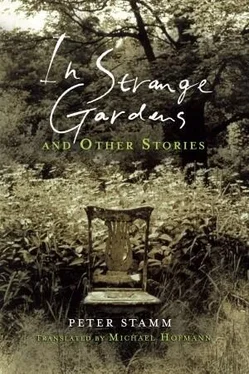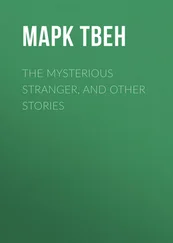Monika coughed and in a disguised voice called out something that might sound like Swedish. There was silence right away.
“I’m going for a shower,” Monika said when we’d got to our tent. “Last showers before the highway.”
By the time she was back, I was already in my sleeping bag.
“Turn away,” she ordered. She undressed, and I smelled the fresh smell of soap. She clicked off the flashlight. We lay side by side, silently. Then Monika asked me: “Do you yell like that each time you sleep with a woman?”
“No,” I said.
“Glad to hear it,” said Monika. “Good night.”
The next morning, when we went down to the canoe rental place, Michael and Sandra were already there. Sandra was talking about universal rights. Everyone was entitled to walk in the forest, and to go on the river, and pick mushrooms and firewood for his own personal use. She said, basically you were allowed to live in the forest. Just like the animals, free, without money. To live off roots and berries, and whatever the forest would provide. Off the fruits of nature, was what she said.
“Hunger, cold, and disease,” said Monika, “those are the fruits of nature.”
Michael stood there silently. Then a canoe rental person came along, and we loaded the canoes onto an old bus, and drove to the starting point of our tour. The road led further and further into the forest. Our driver drove fast, and sometimes he jerked the steering wheel to the side, to avoid a pothole in the unmade road. And then he would laugh. Now it was Sandra who was very quiet, except once I heard her say: “I’m not going to be sick. It’s just a matter of will power.”
Sandra and Michael seemed to get their boat ready to go in no time at all. They paddled off, while the driver was still explaining the use of the camping stove to us, and how to tie the most important knot. We were to keep our life vests on at all times, and keep our baggage tied on, in case we should capsize. Then, before we had the canoe in the water, he had turned the bus, and vanished into the forest.
After a few hours I felt exhausted from the unfamiliar exercise, from the heat of the midday sun, and from the long journey the day before. But I didn’t say anything, and paddled on in silence. Eventually I forgot the soreness in my arms, my strokes became calmer and more rhythmic, and we made steadier progress. I had the sense that my body had detached itself from my head, and was working automatically.
Then, all at once, it was late, and we were surprised that the sun was still so high in the sky. At eleven at night, you could still read a newspaper here out of doors, Sandra had told us in the train, but when we finally found a place to pitch our tent, we merely pitched it and made our supper.
“Ideally, I’d never stop,” said Monika, “just keep going down the river, night and day.”
“It would be nice not to know where we were going,” I said.
“You never know where you’re going anyway.”
The following days all resembled each other. We got up late, made coffee, set out. Sometimes we swam in the river, or lay around on the grass during the midday heat. One sunny afternoon, we moored on a tiny island in the middle of a lake. We had something to eat. I had meant to read, but I was already too tired. I turned onto my back, and closed my eyes. The sun was bright, and I saw colorful whirling shapes in orange and light green that spun in circles. I fell asleep.
When I opened my eyes, the sky above me looked almost black. My mouth was dry, and my body felt warm and heavy. It took me a while to come round. With an effort I turned onto my side. Monika wasn’t there, and I stood up and crossed the little patch of grass to the place where we’d fixed the boat. Monika’s clothes lay on the grass. I looked out onto the lake, and saw her some way off.
“Come on in,” she shouted, swimming back toward me, “the water’s lovely.”
“That sounds like a film,” I said. “The water’s lovely. People only say that in films.”
“But it really is lovely.”
“Funny, you can’t even describe it.”
“It’s true,” she said, “I can’t describe it. Is that silly? But I really can’t.”
She emerged from the water. I had never seen her so nearly naked. Her hair was plastered against her head, and the water dribbled out of her bathing suit.
“Do you know that I used to be hopelessly in love with you?” I said. “You broke my heart. I thought you were the woman of my life.”
“When was that?” asked Monika, shaking the water out of her hair.
“When you told me you didn’t love me.”
“Did I say that?” Suddenly she started laughing. “Oh, if only you could see your face. I remember. It was after our class trip. I was in love with Leo then, but he didn’t like me.”
“When was the first time you slept with a man?” I asked. I had sat down in the grass, and was looking at her. Monika turned her back to me, and pulled off her bathing suit. Then she dried herself with her towel, and got dressed. “I was seventeen,” she said, and turned to face me again, “it was with a friend of my brother’s. He was a lot older. Maybe ten years or so. You were all so childish then with your talk of undying love and God and the meaning of life. I just wanted to see what it felt like.”
“That’s all I wanted too.”
“Nonsense,” said Monika, “you were in love, you just said so.”
We were now paddling through forested country, but we started looking at it more closely, and noticing that the landscape kept changing, and the colors and the water. The water was black or blue or dark green, and sometimes our canoe slipped through patches of water-lilies or through beds of reeds. When there was a wind, we kept inshore. In the evenings, we tried to tally up the days, and looked at the map to see how far we’d come. We soon lost all sense of time.
We hadn’t seen another human being for days when we saw a canoe on the bank. Then we saw Sandra and Michael who were lying naked on the grass. I hoped they wouldn’t see us, but they seemed to hear us, and looked up. They didn’t wave, and we pretended we hadn’t seen them.
“Lying there like animals,” said Monika. “With her, I always have the feeling she’s trying to prove something.”
“Because she’s having a baby?”
“No, it’s not that,” said Monika. “Haven’t you ever seen children where you can just tell they’re going to turn into idiots just like their parents? Even quite small children.”
I thought I wouldn’t mind lying naked with Monika in the grass, and I said so.
“Like an animal,” said Monika. “I couldn’t do that. I’d be scared.”
“There’s no one around.”
“That would be why. There has to be some distinction.”
“I mean just because we’ve known each other for so long,” I said. “I wouldn’t feel ashamed in front of you.”
“I always wanted to be different from my parents. Even though I like my parents. But I don’t want to be just a copy of them. It would be awful if everything just carried on being exactly the same.” She hesitated. Then she said with a laugh: “And why would you feel ashamed anyway?”
When I looked back after a while, I saw Sandra and Michael sitting in their canoe, and coming after us. They were paddling as fast as they could, and shortly after, when they passed us without a word, I could hear their panting. They were dressed now, in swimsuits and T-shirts. Automatically, I started paddling faster, but Monika said, “Oh, don’t. I don’t feel like racing.”
“But I don’t want to have anybody in front of me,” I said. “Do you think they knew it was you, at the campsite?”
“I don’t care,” said Monika. “Fuck them too.”
Читать дальше












